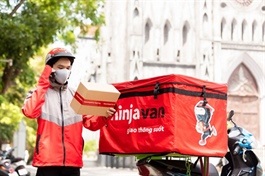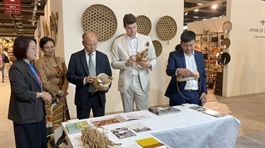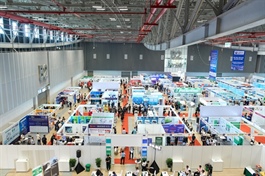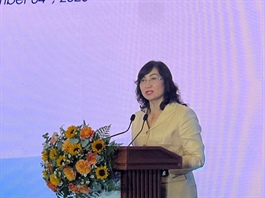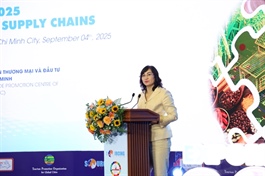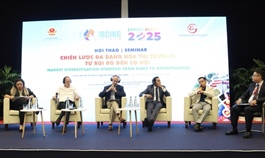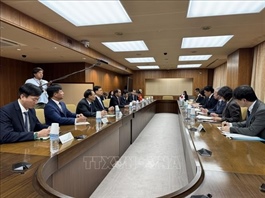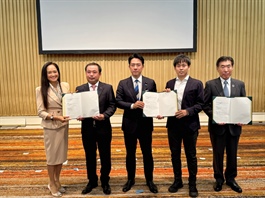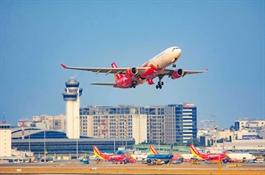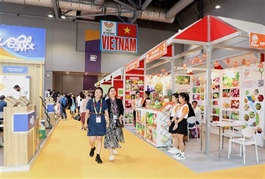Green logistics opens new doors for Vietnamese export businesses
Green logistics opens new doors for Vietnamese export businesses
Green logistics is no longer simply a trend but a prerequisite for Vietnamese companies seeking deeper integration into global supply chains, experts affirmed at the seminar “Green Logistics – A Sustainable Development Trend for Vietnamese Export Businesses” in HCM City on September 5.
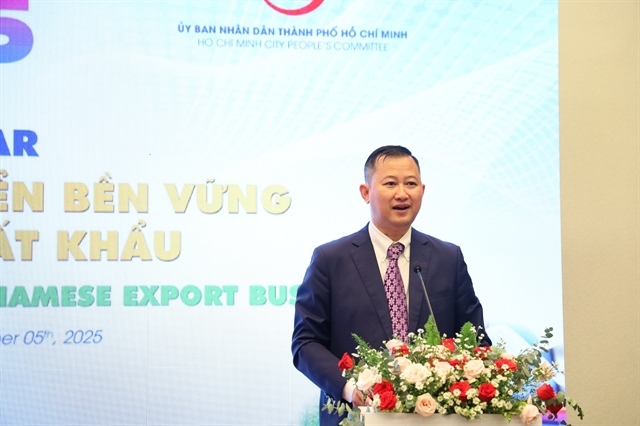
Trần Phú Lữ, Director of the Investment and Trade Promotion Centre of HCM City, speaks at the seminar “Green Logistics – A Sustainable Development Trend for Vietnamese Export Businesses” in HCM City on September 5. — Photo courtesy of ITPC |
Green logistics is no longer simply a trend but a prerequisite for Vietnamese companies seeking deeper integration into global supply chains, experts affirmed at the seminar “Green Logistics – A Sustainable Development Trend for Vietnamese Export Businesses” in HCM City on September 5.
In his opening remarks, Trần Phú Lữ, Director of the Investment and Trade Promotion Centre of HCM City (ITPC), stressed that green logistics is now a key criterion for assessing the sector’s sustainability. He noted that “by adopting green logistics, businesses can expand their customer base, increase revenue, reduce costs, and strengthen competitiveness in the long term.”
Việt Nam has strong potential to become a regional logistics hub. The country’s strategic location with a 3,260km coastline, deep-water ports, international airports, and a fast-growing manufacturing and e-commerce economy provide significant advantages. The logistics sector has recorded average annual growth of 14–16 per cent, with a market value of US$45–50 billion. Việt Nam ranks 43rd out of 139 countries and territories in the Logistics Performance Index and fifth among ASEAN members.
Despite these strengths, logistics costs remain high. Domestic enterprises are fragmented, lack linkages, and rely heavily on road transport. Moreover, logistics activities generate substantial environmental impacts such as emissions, noise, and industrial waste. Against this backdrop, green logistics is no longer optional but an urgent requirement, he noted.
The Government has in recent years prioritised infrastructure investment, with new expressways and upgraded seaports helping firms cut costs and emissions. Many logistics companies are also innovating operations, expanding international cooperation, and applying new technologies.
He encouraged businesses to invest in environmentally friendly vehicles, optimise warehousing with GPS-based management, adopt cold chain technologies, and use smart systems to save energy and reduce waste.
Trương Tấn Lộc, Vice Chairman of the HCM City Logistics Association (HLA), highlighted challenges from new EU environmental regulations. The Carbon Border Adjustment Mechanism, which takes full effect in 2026, requires exporters to purchase certificates covering the embedded carbon emissions generated in the production of certain goods imported into the EU.
The Corporate Sustainability Due Diligence Directive obliges firms to assume responsibility for environmental impacts across supply chains and meet strict ESG standards.
According to Lộc, these rules are redefining carbon pricing globally. Green logistics has become a “trade passport” that allows exporters to maintain market access. Compliance is essential to avoid penalties or bans, while building transparent, sustainable, low-emission supply chains is what convinces buyers to choose Vietnamese suppliers.
Green logistics data will soon act as a performance benchmark that enhances brand value and strengthens negotiating power, he said.
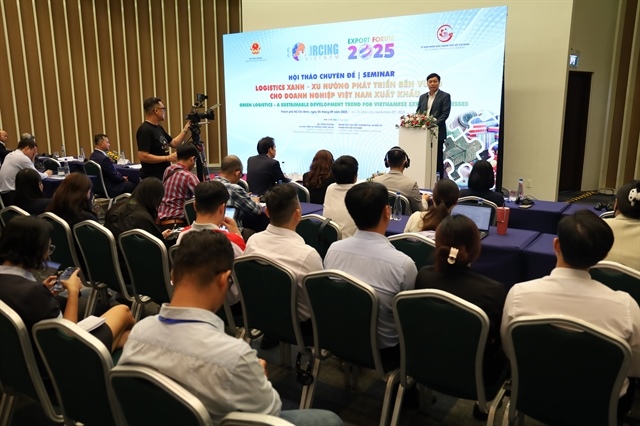
Trần Phú Lữ, Director of the Investment and Trade Promotion Centre of HCM City, speaks at the seminar “Green Logistics – A Sustainable Development Trend for Vietnamese Export Businesses” in HCM City on September 5. — Photo courtesy of ITPC |
Several domestic examples show the benefits of green logistics. At Tân Cảng Cát Lái Port, full adoption of electronic transactions via ePort cut cargo handling times from hours to just 15–20 minutes, saving $1.5 million–2 million in fuel costs annually and reducing CO₂ emissions through the use of electric cranes. Artificial intelligence has also been applied to optimise routes, helping reduce fuel consumption by up to 15 per cent and delivery times by 25 per cent.
However, major challenges remain. Việt Nam continues to depend heavily on road transport, and connectivity between modes of transport is still limited.
To advance green logistics, HLA has proposed developing unified criteria to measure green logistics nationwide. It also urged breakthrough green finance policies, including preferential credit, tax reductions for electric trucks and energy-saving equipment, and corporate income tax incentives for companies certified in green logistics. A completed legal framework for the carbon credit market is also needed to create new revenue streams for reinvestment in clean technologies.
On infrastructure, HLA called on the Government to accelerate key projects, focusing on locations suited to multimodal transport links to ease road congestion. One important recommendation is the creation of a shared Port Community System for the Southern Key Economic Region to optimise operations.
Human resource development is equally important. Lộc emphasised the need for training reform through cooperation between government agencies, universities, and businesses. He suggested holding regular forums and seminars to raise awareness among business leaders about global green trends and regulations.
Bùi Tuấn Hải, Deputy Head of the Customs Sub-Department of Region II, highlighted the customs sector’s digital transformation, including the Việt Nam Automated Cargo Clearance System, the National and ASEAN Single Window, 24/7 e-tax payment systems, and the Vietnam Automated System for Seaport Customs Management. These initiatives have shortened clearance times for “green lane” goods to just one to three seconds.
Looking ahead, the customs sector aims to implement “Smart Customs” by 2030, applying AI, Big Data, and Blockchain to enhance efficiency.
Hải noted that businesses must stay proactive by keeping up with regulations, ensuring accurate documentation, training staff on digital systems, and working closely with customs to avoid delays and costly errors.
The seminar was organised by ITPC and the International Market Development Department as part of the Vietnam International Sourcing 2025 and Export Forum 2025 held at the Saigon Exhibition and Convention Centre from September 4-6.
- 13:29 06/09/2025




